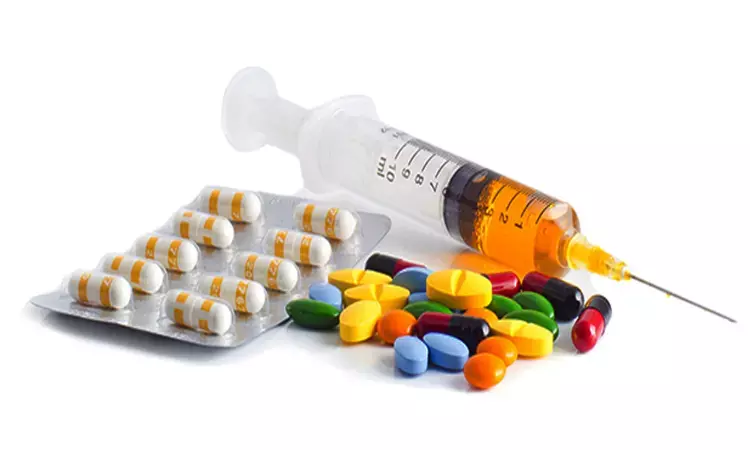- Home
- Medical news & Guidelines
- Anesthesiology
- Cardiology and CTVS
- Critical Care
- Dentistry
- Dermatology
- Diabetes and Endocrinology
- ENT
- Gastroenterology
- Medicine
- Nephrology
- Neurology
- Obstretics-Gynaecology
- Oncology
- Ophthalmology
- Orthopaedics
- Pediatrics-Neonatology
- Psychiatry
- Pulmonology
- Radiology
- Surgery
- Urology
- Laboratory Medicine
- Diet
- Nursing
- Paramedical
- Physiotherapy
- Health news
- Fact Check
- Bone Health Fact Check
- Brain Health Fact Check
- Cancer Related Fact Check
- Child Care Fact Check
- Dental and oral health fact check
- Diabetes and metabolic health fact check
- Diet and Nutrition Fact Check
- Eye and ENT Care Fact Check
- Fitness fact check
- Gut health fact check
- Heart health fact check
- Kidney health fact check
- Medical education fact check
- Men's health fact check
- Respiratory fact check
- Skin and hair care fact check
- Vaccine and Immunization fact check
- Women's health fact check
- AYUSH
- State News
- Andaman and Nicobar Islands
- Andhra Pradesh
- Arunachal Pradesh
- Assam
- Bihar
- Chandigarh
- Chattisgarh
- Dadra and Nagar Haveli
- Daman and Diu
- Delhi
- Goa
- Gujarat
- Haryana
- Himachal Pradesh
- Jammu & Kashmir
- Jharkhand
- Karnataka
- Kerala
- Ladakh
- Lakshadweep
- Madhya Pradesh
- Maharashtra
- Manipur
- Meghalaya
- Mizoram
- Nagaland
- Odisha
- Puducherry
- Punjab
- Rajasthan
- Sikkim
- Tamil Nadu
- Telangana
- Tripura
- Uttar Pradesh
- Uttrakhand
- West Bengal
- Medical Education
- Industry
Steroids of no consequence in improving ICU outcomes in angioedema patients: CHEST

Delhi: Steroid administration in angioedema patients did not affect the length of intubation, intensive care unit hours, and the total length of hospital stay, suggests a recent study in the journal CHEST. The findings were also presented at the 2020 CHEST Annual Meeting held virtually, October 18 to 21.
Glucocorticoids are used routinely for angioedema treatment but its benefits are not clear. There is not enough evidence for its role in angioedema management. In this study, Asma Jamil and colleagues compared patients who did or did not receive corticosteroids for different angioedema subgroups.
For the purpose, the researchers performed a cohort retrospective analysis. It consisted of a total of 3290 angioedema patients (1241 intubated) across 185 US hospitals from the period of 01/2016-01/2020. Angioedema cases were identified using diagnosis codes and time of intubation was calculated from mechanical ventilation procedure codes. Descriptive analyses of patient's characteristics i.e. sex, age, duration of intubation, frequencies of types of angioedema, intensive care unit hours, steroids administration, and the total length of stay were conducted.
The study included a total of 3,290 angioedema patients, 205 in allergic angioedema, 1,955 in unspecified angioedema, and 1,151 in ACE Inhibitor angioedema.
Key findings of the study include:
- ICU hours: Steroids did not affect ICU hours in any subgroup however, age was found to be a significant fact.
- Assuming all other variables remain constant, we found that for every additional year, a patient with any angioedema would be in the ICU for 0.51 hours longer.
- Total length of stay: steroids did not have a significant effect on the total length of stay in any subgroup.
- Length of intubation: steroids were not found to have a significant effect on the length of intubation in any subgroup.
- Steroids, Age, and sex relationship with the type of angioedema: there were no statistical differences in the rates of steroid use among three subgroups.
- A total of 61% of allergic angioedema, 63% unspecified angioedema, 63% ACE inhibitors induced angioedema and all combined 62.61% of patients received steroids.
- There is an association between intubation time and angioedema type.
- In the ACE Inhibitor subgroup, 58% of patients were not intubated, 9% were intubated for <24 hours, 25% were intubated for 24-96 hours, and 5% were intubated for >96 consecutive hours.
- In the allergic subgroup, 68% of patients were not intubated, 10% were intubated for <24 hours, 19% were intubated for 24-96 hours, and 3% were intubated for >96 consecutive hours.
- In the unspecified subgroup, 64% of patients were not intubated, 9.16% were intubated for <24 hours, 22% were intubated for 24-96 hours, and 5% were intubated for >96 consecutive hours.
"To our knowledge, this is the largest observational study conducted on intubated angioedema patients," wrote the authors.
"Our findings show that steroids were given in 2/3 of intubated angioedema patients without any meaningful outcomes. Steroids use can potentially complicate the clinical picture and expose vulnerable patient populations to side effects," they concluded.
"Large retrospective study analyzing role of steroids use in intubated patients with angioedema," is published in the CHEST journal.
DOI: https://journal.chestnet.org/article/S0012-3692(20)32254-6/fulltext
Dr Kamal Kant Kohli-MBBS, DTCD- a chest specialist with more than 30 years of practice and a flair for writing clinical articles, Dr Kamal Kant Kohli joined Medical Dialogues as a Chief Editor of Medical News. Besides writing articles, as an editor, he proofreads and verifies all the medical content published on Medical Dialogues including those coming from journals, studies,medical conferences,guidelines etc. Email: drkohli@medicaldialogues.in. Contact no. 011-43720751


